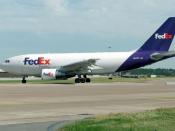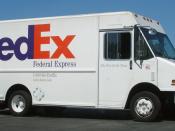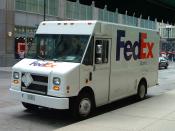This paper looks at these two well known companies, United Parcel Services (UPS). And Federal Express (FedEx). This paper will examine their working capital positions as competitors as well as suppliers in the delivery industry. This paper will explore the functions of the intermediaries and financial regulatory bodies. In conclusion, this paper will delve into the 2002 Sarbanes-Oxley and how it impacted both businesses.
Working capital is defined as "a company's current assets minus its current liabilities - considered a good measure of both a company's efficiency and its financial health" (Dictionay.com, 2006). Quantifiably it is important for a company to invest the capital wisely in order to have a future cash savings in relation to the current cash outlays of the investments (Albrecht, Stice, and Swain, 2005, p. 952).
UPS had a decrease of over $2.5 billion from 2004 to 2005 because of the net sales of securities and short-term investments which were used to fund business acquisitions and benefits plans.
In 2005 UPS spent $1.488 billion on the acquisitions of Overnite Corp., Lynx Express Ltd. in the United Kingdom, Messenger Service Stolica S.A. in Poland, and express operations in China, Sinotrans Air Transportation Development Co. Ltd (UPS, 2005, pgs 27-28).
Financing activities in 2005 were increased from $2.014 billion in 2004 to $4.175 billion in 2005. This cash was used to pay dividends, repurchase stock, and repay long-term debt. The Board of Directors also authorized an additional $2.0 billion for future share repurchases. Debt from paydowns of commercial paper, scheduled principal payments on capital lease programs, and repayments of debt with previous acquisitions were repaid in 2005 at $589 million. Loans relating to the investment in equity-method real estate were $128 million in 2005 (UPS, 2005,pg. 28, 2006).
FedEx had...


